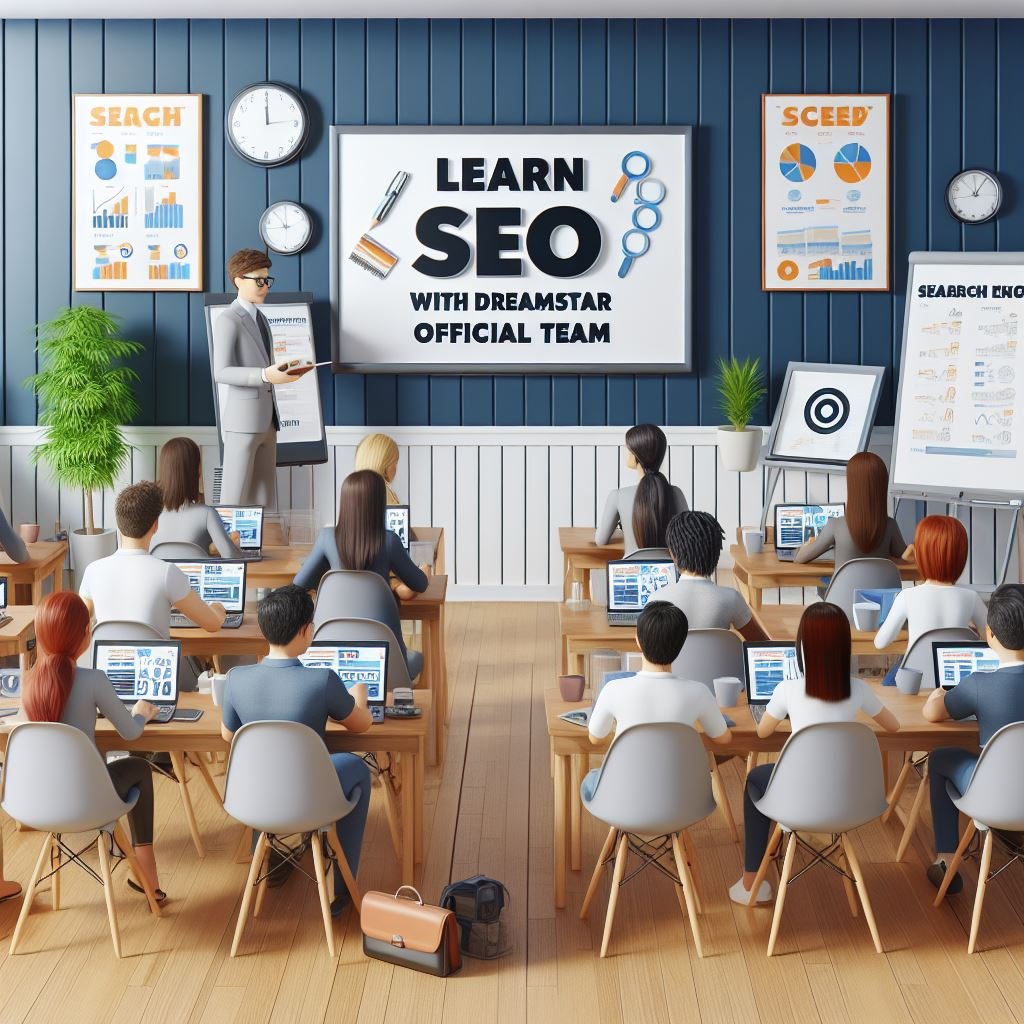Learn SEO with Dreamstar Official Team: Boost Your Digital Marketing Knowledge
Enhance Your SEO Skills with Dreamstar Official Team

SEO
Introduction to SEO
Learning SEO can be valuable for a variety of reasons:
1. Increase Website Traffic: By optimizing your website for search engines, you can attract more organic traffic, leading to increased visibility and potential customers.
2. Cost-Effective Marketing: SEO can provide long-term results without ongoing costs, making it a cost-effective marketing strategy compared to paid advertising.
3. Boost Business Growth: Higher visibility in search results can lead to more customers, helping your business grow and succeed.
4. Improve User Experience: SEO involves optimizing website structure and content, which often leads to a better user experience.
5. Stay Competitive: Many businesses use SEO to improve their online presence. Learning SEO can help you stay competitive in your industry.
6. Understand Customer Intent: SEO involves researching keywords and phrases your target audience uses, helping you understand their needs and preferences.
7. Track and Measure Results: SEO tools allow you to track your website’s performance, providing insights into your audience and the effectiveness of your strategies.
8. Build a Strong Online Presence: Good SEO practices can help establish your brand as a credible and authoritative source in your industry.
9. Stay Up-to-Date: The digital landscape is constantly evolving, and learning SEO keeps you informed about the latest trends and technologies.
10. Open Career Opportunities: Proficiency in SEO can open up various job opportunities in digital marketing, content creation, and other related fields.
Overall, learning SEO can benefit individuals and businesses alike by enhancing online visibility, improving user experience, and driving business success.
Understanding Search Engines
Search engines work by following a multi-step process that involves crawling, indexing, and ranking content on the internet. Here’s how it works:
1. Crawling:
– Search engine bots (also known as crawlers or spiders) visit websites across the internet to discover new pages and content.
– The bots follow links within websites and across the web to explore and gather information about the content on each page.
2. Indexing:
– Once the search engine bots have crawled a page, the content is stored and organized in a massive database called an index.
– The index includes information about the content, such as keywords, metadata, and the page’s structure.
– Indexing makes it easier for search engines to quickly retrieve information when a user submits a query.
3. Ranking:
– When a user enters a search query, the search engine uses complex algorithms to evaluate and rank the most relevant pages from its index.
– The algorithms take into account factors such as keyword relevance, content quality, user experience, backlinks, page speed, and mobile-friendliness.
– The search engine aims to deliver the best possible results for the user’s query, ranking them in order of relevance and quality.
4. Displaying Results:
– The search engine displays the results on a search engine results page (SERP) based on the ranking.
– The results may include organic listings, paid advertisements, local results, images, videos, news, and other content types.
Search engines continuously refine their algorithms to deliver the most relevant and useful results to users. As a result, websites must stay up-to-date with best practices in SEO to maintain their visibility and ranking.
Search engines like Google use complex algorithms to evaluate and rank content in their search engine results pages (SERPs). While the exact details of these algorithms are not publicly disclosed and may vary over time, there are key factors that typically play a significant role in search engine ranking:
1. Relevance:
– The content must match the user’s search query closely.
– Use of relevant keywords and phrases in the content and metadata helps establish relevance.
2. Quality and Freshness of Content:
– High-quality content that is informative, well-written, and unique tends to rank higher.
– Fresh content, or content that is updated regularly, may receive a boost in rankings.
3. Backlinks and Authority:
– Backlinks from reputable, authoritative websites signal trustworthiness and authority to search engines.
– The quality and relevance of the linking site are more important than the quantity of links.
4. User Experience:
– Search engines favor websites that offer a positive user experience, including easy navigation, mobile-friendliness, and fast loading times.
5. Page Speed:
– Faster loading times enhance user experience and may contribute to higher rankings.
6. Mobile-Friendliness:
– With the rise of mobile search, websites that are optimized for mobile devices tend to perform better in rankings.
7. Structured Data:
– Using structured data (schema markup) helps search engines understand the content better and may improve the display of results (e.g., rich snippets).
8. Domain Authority:
– The overall authority and trustworthiness of the website’s domain can impact rankings.
9. User Engagement:
– Metrics such as click-through rates (CTR), bounce rates, and time on page can indicate the quality and relevance of content to users.
10. Local SEO:
– For local searches, factors such as proximity, local reviews, and business information accuracy play a significant role in rankings.
These are some of the key factors that search engine algorithms consider when ranking web pages. It’s important to keep in mind that algorithms are constantly evolving, so staying up-to-date with the latest SEO best practices is crucial for maintaining good search engine rankings.
Types of seo
On-page SEO is the practice of optimizing individual web pages on your website to improve their visibility and ranking in search engine results pages (SERPs). It involves adjusting both the content and HTML source code of a page to make it more appealing to search engines and users. By focusing on on-page SEO, you can improve the relevance and quality of your pages, leading to better search rankings and increased organic traffic.
Here are some key elements of on-page SEO:
1. Keyword Optimization:
– Incorporate relevant keywords naturally throughout the content, including in the title, headers, body text, and metadata.
– Use variations of keywords to maintain readability and avoid keyword stuffing.
2. Title Tags:
– The title tag is an HTML element that specifies the title of the web page and appears in search results.
– Include the main keyword and keep the title tag concise and descriptive.
3. Meta Descriptions:
– A meta description is a brief summary of a page’s content that appears in search results.
– Write a clear and engaging meta description that includes relevant keywords and encourages users to click through.
4. Headers (H1, H2, H3, etc.):
– Use header tags (H1, H2, H3, etc.) to structure content and make it easier for search engines and users to understand.
– Include keywords in headers where appropriate.
5. URL Structure:
– Use descriptive, keyword-rich URLs that accurately represent the page’s content.
– Avoid using numbers, special characters, or unnecessary words in URLs.
6. Image Optimization:
– Optimize images with descriptive file names and alt text that includes relevant keywords.
– Compress images to improve page loading times.
7. Content Quality and Length:
– Create high-quality, original content that provides value to your audience.
– Aim for a sufficient length to cover the topic in depth while remaining concise and engaging.
8. Internal Linking:
– Use internal links to connect related pages within your website, helping search engines understand the structure of your site.
– Internal links also help distribute authority across your site and improve user experience.
9. External Linking:
– Link to reputable external sources when appropriate, which can add credibility and context to your content.
10. User Experience:
– Optimize for user experience by ensuring your page loads quickly, is easy to navigate, and is mobile-friendly.
– Aim for a clean, organized layout and clear calls to action.
By implementing these on-page SEO strategies, you can improve your pages’ visibility in search results, enhance the user experience, and ultimately drive more organic traffic to your website.
Off-page SEO involves activities and strategies that take place outside of your website to improve its visibility, authority, and credibility in search engine results pages (SERPs). The primary focus of off-page SEO is building high-quality backlinks and increasing your website’s reputation across the web. Here are some key elements of off-page SEO:
1. Backlink Building:
– Acquiring links from other reputable websites to your site.
– High-quality, relevant backlinks signal trustworthiness and authority to search engines.
– Backlinks can be obtained through guest posting, partnerships, influencer outreach, and content marketing.
2. Social Media Marketing:
– Promoting your content and engaging with your audience on social media platforms like Facebook, Twitter, LinkedIn, and Instagram.
– Although social signals (likes, shares, and comments) may not directly impact search rankings, they can help increase visibility and traffic.
3. Brand Mentions:
– When other websites mention your brand or website without providing a direct link, it can still contribute to your online reputation.
– Monitor and engage with brand mentions to strengthen your online presence.
4. Influencer Outreach:
– Collaborate with influencers and industry experts to promote your content and reach a wider audience.
– Influencers can help increase brand awareness and drive traffic to your website.
5. Content Marketing:
– Create high-quality, shareable content such as blog posts, videos, infographics, and podcasts that others may want to link to or share.
– Share your content across multiple channels to maximize its reach.
6. Local SEO and Citations:
– For businesses targeting a local audience, building local citations (mentions of your business name, address, and phone number) can improve local search rankings.
– Ensure your business information is consistent across online directories and review sites.
7. Online Reviews:
– Encourage positive reviews from customers on platforms like Google Business Profile, Yelp, and other review sites.
– Positive reviews can enhance your reputation and influence local search rankings.
8. Guest Blogging:
– Write and publish articles on reputable websites within your niche to gain exposure and acquire backlinks.
– Ensure that the guest post includes a link back to your website.
Off-page SEO is an important aspect of your overall SEO strategy, as it helps establish your website’s authority, credibility, and trustworthiness in the eyes of search engines and users. By implementing effective off-page SEO strategies, you can improve your website’s ranking and visibility in search results.







